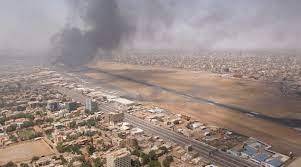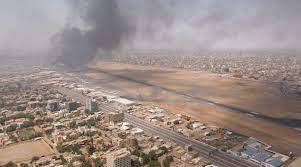A senior U.S. State Department official announced today, Tuesday, that the warring parties in Sudan are not seizing the opportunity of the Jeddah talks initiated by the United States and Saudi Arabia, aimed at achieving a permanent ceasefire as initially agreed upon. The official, speaking from Washington on the condition of anonymity, stated that the United States is currently consulting with Saudi Arabia and Arab and African countries to find a path forward and hopes to announce a recommended approach in the coming days.
He continued, "We believe we have given them every available opportunity. We chose this location to allow them to try and meet together and find a way to move forward that does not lead to a result based on violence or military dominance." He added, "It is clear that they are not taking advantage of this framework we provided them. The way they initially agreed upon has not been successful regarding this gradual process aimed at achieving a permanent cessation of hostilities."
The Jeddah talks have not led to a permanent halt to the fighting, and clashes intensified as soon as the ceasefire expired on Sunday. The U.S. official indicated that the military refused to extend the ceasefire for an additional 24 hours. Airstrikes, shelling, and gunfire shook the capital, Khartoum, and the neighboring cities of Bahri and Omdurman, leading to civilian casualties. Violence continued in some areas of Khartoum yesterday, while residents noted a relative calm.
The fighting has caused a significant humanitarian crisis for civilians, with frequent power and water outages. According to the United Nations, citing government statistics, at least 866 people have been killed, and more than 6,000 have been injured in the fighting. Another senior U.S. official told reporters that there is an "awakening on the horizon" between the warring parties regarding the absence of an acceptable military solution. However, the official noted that this has not yet translated into readiness to take concrete steps toward a longer ceasefire and a definitive end to hostilities.
**Considering a Reduction in Talks**
The second official mentioned that the United States is questioning how much the Jeddah talks can lead to a broader cessation of hostilities and is considering whether to reduce the talks and focus on humanitarian aid. He added, "This is something we are actively discussing with partners." He mentioned that the warring parties have not received much external support so far, despite concerns that the conflict might attract foreign entities, and emphasized efforts are being made to maintain the current status quo.
The first official noted, "I think their former partners are somewhat shocked. Everyone is shocked—no one can believe that anyone would act in such a suicidal manner. They are concerned about the impact on their country and the region." Today, the Rapid Support Forces announced that it had taken control of the Um Dafuq military base near the border with the Central African Republic.
The extent of the losses on both sides remains unclear, but the military and the Rapid Support Forces have not appeared to establish dominance. The fighting has spread to other parts of Sudan, particularly the city of Geneina in West Darfur, where activists have reported 1,100 deaths. Previous ceasefire agreements had allowed some humanitarian aid to reach the country, but relief agencies have stated that fighting, bureaucratic procedures, and looting continue to hinder aid delivery.




